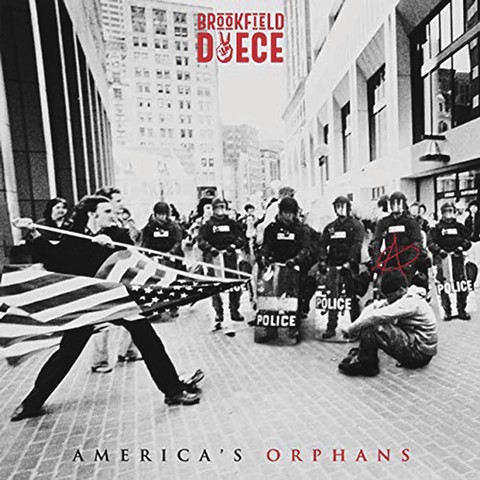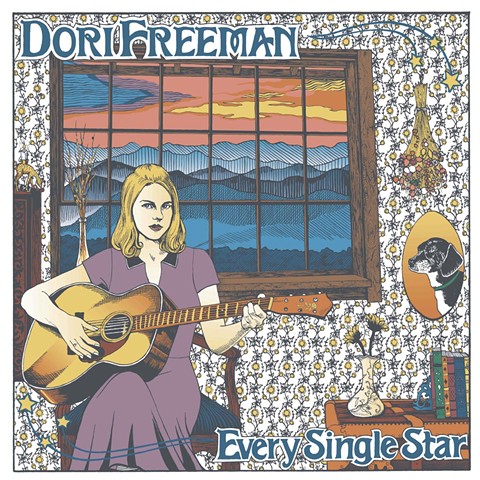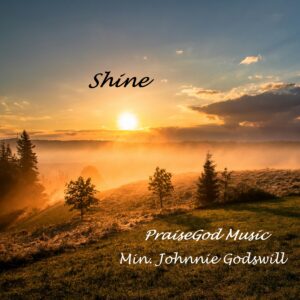

Ben Goldberg
Good Day For Cloud Fishing
Even by the standards of the multifariously creative Berkeley clarinetist/composer Ben Goldberg the album Good Day For Cloud Fishing offers a vast and delectable feast for the mind and ears. Musically it’s a spacious, conversational trio session with trumpet great Ron Miles and ingenious guitarist Nels Cline, but the project is designed as an encounter with the epigrammatic poetry of Dan Young. Goldberg includes 12 cards in the CD box with the poems that inspired each piece. While the trio recorded the music, Young was in the studio writing new poems inspired by the music (each “exit” verse is featured on the back of the card with the initial “entry” poem). The push and pull of verse and improvisation work together in strange and wonderful ways. — Andrew Gilbert
Big Thief
Two Hands
Big Thief is a rock band that veers from hardcore, post-rock noise to folky, contemplative ballads. Adrianne Lenker, the band’s main songwriter, lead singer, and rhythm guitarist is an imposing performer. On stage, she’s the band’s focal point, but on record, she shares the spotlight with the avant-garde guitar noise created by lead guitarist Buck Meek and the relentless rhythms generated by James Krivchenia’s drums and Max Oleartchik’s bass. The songs on Two Hands are all driven by mid-tempo grooves that intensify the impact of the music and Lenker’s apocalyptic lyrics. The album is divided into a pair of five-song suites — half of them long-time crowd favorites, unrecorded until now, and half ominous new compositions, inspired partly by our current political situation. — j. poet
Brookfield Duece
America’s Orphans
All too often, the Oakland rap scene is pigeonholed as strictly about the “Hyphy” culture, with its manic bass, over-the-top gear, and distinct slang. But that overlooks more lyrical, contemplative artists like Del Tha Funky Homosapien, Lyrics Born, The Hieroglyphics, The Coup, and many others. Only now are people beginning to accept the cosmopolitan flow of Brookfield Duece. Duece’s tracks are often low-tempo and low-key, and his baritone is slow and contemplative. Unlike many of the new styles of delivery, he focuses on a polysyllabic lyricism that leans heavily on alliteration and meter. His method reflects the golden age of hip-hop, but is sprinkled lightly with Town embellishments. He calls his rapping style East Oakland Southern Flow, and it’s not to be slept on. — D. Scot Miller
Bryan McPherson
King’s Corner
With digital streaming platforms and social media connecting everyone (and especially people who would rather not be connected), it may seem like a folk music troubadour would be a relic of the past. But former East Bay based singer-songwriter Bryan McPherson is the voice we need right now. He was heavily involved with the Occupy Oakland protests and expressed its rage and hope brilliantly in 2015’s Wedgewood. This year, he followed up the album with his most intimate, and perhaps most singer-songwriter-y album to date: Kings Corner. The songs started (mostly) as much of his early, unrecorded work from over a decade and a half ago, that were never properly released. He intended to record these songs to give away to fans, but as he worked on it, he realized the songs could use work and be a legit album. These songs deal with drug addiction, death, grief, and overwhelming sadness. They hit hard and still resonate. — Aaron Carnes
Carly Rae Jepsen
Dedicated
You might have missed it, but pop music has changed in the past decade. The genre has mutated with the help of some of indie music’s greatest minds like Rostam Batmanglij, Ariel Rechtshaid, and Dev Hynes working behind the scene creating subtly complex, artsy collaborations with pop singers. Carly Rae Jepsen was one of the first to embrace this shift head-on. Rather than attempting to recreate her 2011 mega-hit “Call Me Maybe,” she’s been diving into ’80s infused love-sick synth-pop, hovering just below the mainstream with brilliant ultra-catchy pop tunes. Her latest, Dedication, is the full expression of pop as art. Her songs are never too deep beneath the surface, opting for arena-huge emotions and infectious earworm melodies. Yet, it retains the charm of a musician operating outside of the music industry, writing the kind of lush arrangements she feels deep in her soul. — AC
Davina and The Vagabonds
Sugar Drops
A piano player, songwriter, and bandleader, Davina Sowers draws on the catalogue of the Great American songbook for tunes that combine the pop sounds of the past with the blues and jazz she grew up with. On this recording, her usual band is augmented by a handful of session players that help her explore the music of New Orleans, with hints of girl group R&B, jazz, reggae, swing, and early country music in the mix. Sowers’ impressive vocal style has hints of Billie Holiday, Maria Muldaur, and Janis Joplin in her delivery. Standouts include “Bone Collection” a syncopated second line strut, “No Matter Where We Are,” a country meets reggae hybrid and “Magic Kisses” a swinging tune that sounds like it was lifted out of a Las Vegas lounge in 1950. — jp
Dori Freeman
Every Single Star
Freeman was born and raised in Galax, Virginia, a stop on the Crooked Road Music Heritage Trail. She still lives there, proud to be part of the current crop of young, progressive Appalachian musicians. Although she listened to rock when she was younger, she was always drawn to the traditional music her family played at home. After she started writing her own songs, she sent a few of them to Teddy Thompson’s Facebook page. He liked them and produced her first album, Dori Freeman, as well as this follow up. While still deeply rooted in the sounds of Appalachia and Americana, Every Single Star sees her branching out musically, while retaining the plainspoken poetry of her lyrics and simple fervor of her understated vocals. — jp
Her Crooked Heart
To Love To Leave To Live







